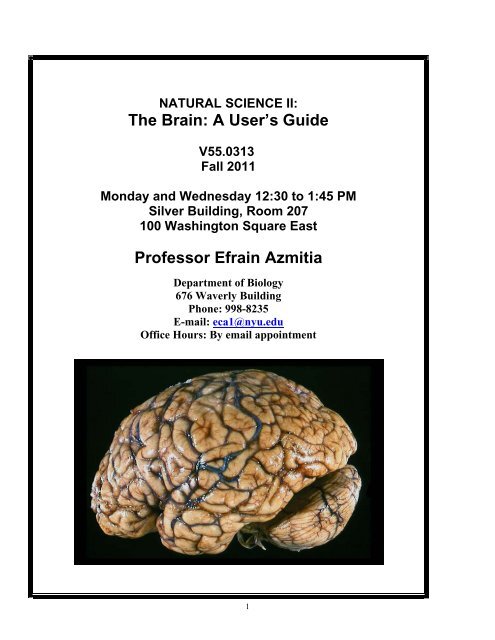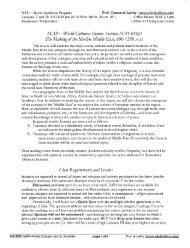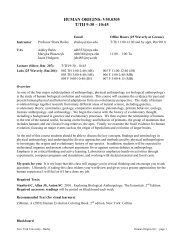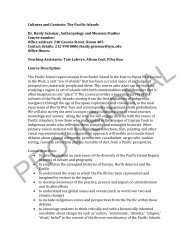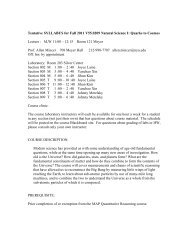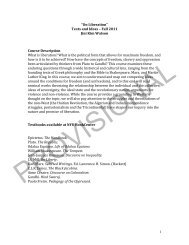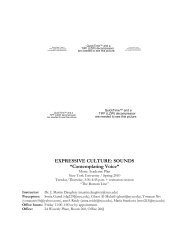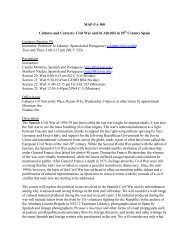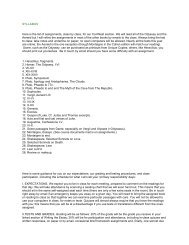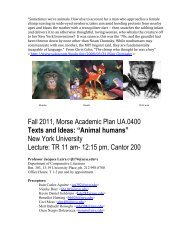The Brain: A User's Guide Professor Efrain Azmitia
The Brain: A User's Guide Professor Efrain Azmitia
The Brain: A User's Guide Professor Efrain Azmitia
Create successful ePaper yourself
Turn your PDF publications into a flip-book with our unique Google optimized e-Paper software.
NATURAL SCIENCE II:<br />
<strong>The</strong> <strong>Brain</strong>: A User’s <strong>Guide</strong><br />
V55.0313<br />
Fall 2011<br />
Monday and Wednesday 12:30 to 1:45 PM<br />
Silver Building, Room 207<br />
100 Washington Square East<br />
<strong>Professor</strong> <strong>Efrain</strong> <strong>Azmitia</strong><br />
Department of Biology<br />
676 Waverly Building<br />
Phone: 998-8235<br />
E-mail: eca1@nyu.edu<br />
Office Hours: By email appointment<br />
1
1. Course Description<br />
<strong>The</strong> Human <strong>Brain</strong> is the most complex organ. Despite the central position it has in nearly every aspect of<br />
our daily lives, it remains to many a mystery. How does it work? How can we care for it? How long will it<br />
function? This MAP course is designed to provide answers to these questions, and many more at an<br />
academic level accessible to the non-scientist student, and of interest to the scientist with little exposure to<br />
neuroscience.<br />
<strong>The</strong> aims of the course are to provide the student with a firm foundation in what the brain looks like and<br />
what each of the parts do. To accomplish this, we will learn about the functions of the cortex in higher<br />
learning and memory, as well as discuss the basic work of the brainstem in regulating the internal<br />
environment of the body. <strong>The</strong> importance of nutrition on neurotransmitter synthesis, the function of sleep on<br />
memory and why we need so much of it, and the effects of alcohol and drugs on brain harmony and the<br />
meaning of addiction will be some of the points covered in this course. We will look at brain development<br />
and the special needs of children, as well as brain aging and illness and the difficulty of helping.<br />
<strong>The</strong> laboratories are designed to provide hands-on experience in exploring the structure of the brain as well<br />
as learning how to measure brain functioning. We will provide specially prepared slides so the student can<br />
recognize a neuron and differentiate a dendrite from an axon. <strong>The</strong> molecular shape of neurotransmitter will<br />
be covered, as well as learning how to measure alcohol and determining its levels in your body.<br />
It is expected that by the end of the course, the student will be familiar with the biological basis of brain<br />
structure and function, and not only be able to detect how a normal brain works, but also how to help keep it<br />
healthy.<br />
Teaching Assistants<br />
Allyson Impallomeni asi224@nyu.edu<br />
Milad Afrasiabi ma2434@nyu.edu<br />
Shyamprasad Mukundan sm3774@nyu.edu<br />
2. Course Objectives<br />
• To acquire an understanding of the biological complexity and dynamics of the brain.<br />
• To understand the basis of learning and memory, and how to maximize our performance.<br />
• To develop skills in problem solving and interpreting scientific information.<br />
• To engage in various methods of scientific investigation in the laboratory.<br />
• To critically evaluate popular media reports in neuroscience research.<br />
• To address the complex ethical, social and legal consequences of mental illness<br />
3. Course Texts and Readings<br />
Required/Suggested Texts<br />
Required: Notes for lectures will be available on Black Board several days before the lecture. Please<br />
download and bring to class. <strong>The</strong> final lecture power point will be uploaded after the class. <strong>The</strong> final<br />
PowerPoint will be used for examination questions.<br />
Strongly Suggested Text (Available from Amazon.com): Neuroscience: Exploring the <strong>Brain</strong> (Book with CD-<br />
ROM) - Mark F. Bear et al; Hardcover # Lippincott Williams & Wilkins; 3 rd Book & CD edition (2007) ISBN:<br />
0-7817-60038 Available from Amazon. New $53.<br />
Suggested: Drugs and Society - Glen Hanson, Peter Venturelli and Annette Fleckenstein; Paperback,<br />
Publisher: Jones and Bartlett; 9th edition (January 2006), ISBN: 0-7637-3732-1<br />
2
4. Lecture, Reading, and Laboratory Schedule<br />
Date Lecture/Laboratory<br />
Module 1: Framework<br />
# 1 W Sept 7 Course Overview History<br />
Sept 8/9 No Lab<br />
#2 M Sept. 12 Neuron<br />
#3 W Sept. 14 Receptors<br />
Sept. 15/16 Lab 1: Sheep <strong>Brain</strong> Dissection 1<br />
#4 M Sept. 19 Glial Cells<br />
#5 W Sept. 21 Development <strong>Brain</strong> Anatomy<br />
Sept. 22/23 Lab 2: Sheep <strong>Brain</strong> Dissection 2<br />
Module 2: Contents: Chemicals and Cells<br />
M Sept. 26 Test 1<br />
#6 W Sept. 28 Chemical Senses<br />
Sept. 29/30 Lab 3: Chemical Sensations<br />
#7 M Oct 3 Somatic Sensory<br />
#8 W Oct. 5 Auditory, Visual<br />
Oct.6/7 Lab 4: Microscopy * Paper I is Due<br />
M Oct. 10 No Class<br />
#9 W Oct 12 Global System<br />
Oct. 13/14 Lab 5: Morphometrics<br />
M Oct 17 Test 2<br />
#10 W Oct 19 Neural Plasticity<br />
Oct. 22/23 Lab 6: Photosynthesis<br />
Module 3: Drugs and Alcohol<br />
#11 M Oct 24 Alcoholism<br />
3
#12 W Oct 26 Drugs of Abuse: Addictive<br />
Oct. 27/28 Lab 7: Measuring Alcohol<br />
#13 M Oct. 31 Hallucinogens<br />
#14 W Nov. 2 Marijuana<br />
Nov. 3/4 Lab 8: Molecular Structures of Neurotransmitters<br />
M Nov. 7 Test 3<br />
#15 W Nov. 9 Hormones, Sex and Violence<br />
Nov. 10/11 Lab 9: Scientific Method<br />
Module 4: Complex Systems<br />
#16 M Nov. 14 Sleep Rhythms<br />
#17 W Nov. 16 Limbic System, Stress & Anxiety<br />
Nov. 17/18 Lab 10: Measuring Calories<br />
#18 M Nov. 21 Nutrition, Eating and Obesity<br />
W Nov. 23 Take Home Assignment: Movie on Depression<br />
Nov 24/25 Thanksgiving: NO LAB<br />
Module 5: Problems<br />
#19 M Nov 28 Depression & Suicide<br />
W Nov 30 Test 4<br />
Dec 1/2 Lab 11: Tests and Rating Scales for Depression<br />
#20 M Dec 5 Schizophrenia (Language & Aphasia)<br />
#21 W Dec.7 Autism (Developmental Disorders)<br />
Dec. 8/9 Lab 12: Diagnosis using the DSM-IVR *Paper II Due<br />
#22 M Dec 12 Memory & Aging: Link to Dementia<br />
#23 W Dec 14 Who am I: <strong>Brain</strong> Washing<br />
Dec. 15/16 Optional Review Sessions (Contacts TAs)<br />
M Dec. 19 Final Examination (12:00-1:45PM)<br />
4
5. Grades<br />
Tests 1-4 40 % Average of best 3 grades, allow one drop<br />
Final Exam 25 %<br />
Laboratory 25 %<br />
Papers 10 %<br />
6. Policies<br />
Test (40%) and Final Exam (25%)<br />
• <strong>The</strong> tests will contain True/False and multiple choice questions covering the lectures. Lecture material<br />
will include all information on the slides from posted on BlackBoard. All the tests will be individually<br />
graded on a curve with the class mean set at 78. 40% of grade<br />
• You are allowed to miss one test, or drop the lowest grade, without permission of the instructor. If you<br />
miss a second test, without permission, it will be graded as a zero. No make-up tests will be given for<br />
the tests.<br />
• <strong>The</strong> final exam will be cumulative and will cover topics from throughout the course. <strong>The</strong> same<br />
questions used in tests 1-4 will be included in the final. In addition all the new material covered in the<br />
last four lectures will be presented as new questions. This grade will not be curved. <strong>The</strong> final exam will<br />
count for 25% of your grade<br />
• A make-up will be given for the final exam only under exceptional circumstances that must be<br />
discussed with <strong>Professor</strong> <strong>Azmitia</strong> prior to the exam.<br />
Laboratory Grade (25%)<br />
<strong>The</strong>se grades will be given by your Teaching Assistance. <strong>The</strong>re are 11 laboratory sessions and attendance is required (one excused<br />
absence is permitted). If you can not make your assigned section, accommodations will be made for you to attend another section<br />
the same week. This must be done prior to your session. If you miss a session due to illness or accident, your TA will assign a<br />
make-up time for you to do the work. Laboratories will be graded as Excellent (25 pts), Satisfactory (20 pts) or Poor (10pts).<br />
<strong>Brain</strong> Papers (10 % of Grade)<br />
You are required to hand in two papers for this course which will count for 10% of your grade. <strong>The</strong> paper are to be<br />
1000 words in length, double space, 12 pt. Arial font with 0.5 margins and submitted on line to your T.A. <strong>The</strong> first paper<br />
is due before Laboratory 4, the week of October 4, 2011 and the second before last laboratory on Dec. 12, 2011<br />
Papers will be judged Excellent (5 pts.), Satisfactory (4 pts) or Poor (2 pts).<br />
<strong>The</strong> First paper be divided into four sections..<br />
I. Introduction dealing with your prior exposure to information about brain structure and function (memory,<br />
sleep, drug addiction). Also indicate your level of understanding of brain diseases. Books you have read,<br />
formal courses taken, lectures and conversations about the brain.<br />
II. Discuss specific aspects of the lectures and laboratories you enjoyed and which you found not very<br />
relevant. Give reasons for your opinions.<br />
III. Mention and discuss specific topics you would like to be considered in the remaining part of the lecture<br />
course and why.<br />
IV. Finally, provide some specific feedback. Do you have any suggestions for how the lectures can be<br />
improved? In the laboratory sections, are there specific things you would have liked to have done?<br />
5
For the Final <strong>Brain</strong> Paper, pick one specific aspect of the brain you have studied in this course (e.g. limbic system,<br />
serotonin, sleep, memory, addiction, autism), and provide a personal and specific discussion of the topic. Please refer<br />
to specific information garnered in the course and how this has led to your interest in this area. <strong>The</strong> paper should<br />
make frequent reference to <strong>The</strong> <strong>Brain</strong>: A User’s <strong>Guide</strong> material and it must be clear to the T.A. reading this paper that<br />
the ideas are yours and based on your experience in class/laboratory.<br />
Please list and discuss articles from the WEB, scientific papers, newspaper articles and books that have shaped your<br />
thinking. Make sure all referenced material is in quotes.<br />
Submitting unedited detailed academic accounts copied verbatim from the WEB or other sources is not<br />
allowed and proven cases of plagiarism, no matter how brief, will result in loss of all 10 points.<br />
Final Grade<br />
Letter grades for each student will be based on the cumulative scores from final, test average (3 best of 4),<br />
laboratory and brain papers.<br />
A : 100-90<br />
A-: 87-90<br />
B+: 86-83<br />
B: 82-72<br />
B-: 71-69<br />
C+: 68-65<br />
C: 64-54<br />
C-: 53-50<br />
D:


